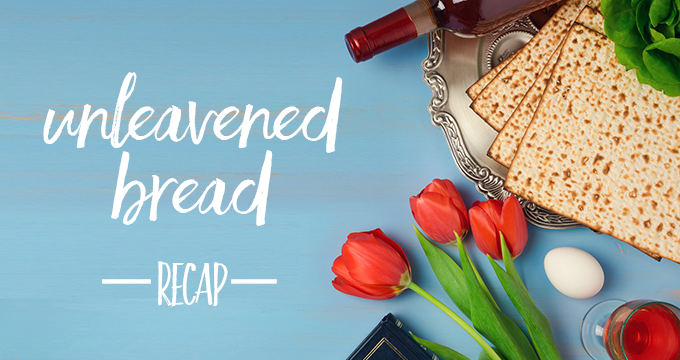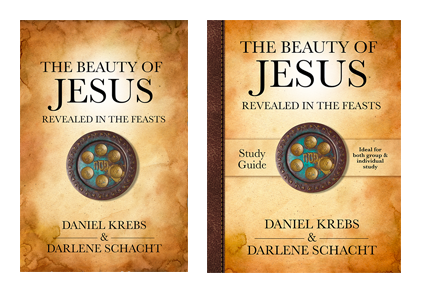
The Beauty of Jesus Revealed in the Feasts
You can find both the book and the study guide on Amazon:
Click here for the book, and here for the study guide
Chapter 2 – The Feast of Unleavened Bread
What other two holy days is the feast of unleavened bread associated with? What order do they fall in?
Passover, Unleavened Bread, and Feast of First Fruits are all basically within the same week in that order.
What three things is leaven compared to in the New Testament?
False teaching
Sinful behavior
The Kingdom of Heaven
What are the New Testament scriptures that compare leaven with sin?
Your boasting is not good. Don’t you know that a little yeast leavens the whole batch of dough? Get rid of the old yeast, so that you may be a new unleavened batch—as you really are. For Christ, our Passover lamb, has been sacrificed. (1 Corinthians 5:5-7)
Therefore let us celebrate the feast, not with old leaven, nor with the leaven of malice and wickedness, but with the unleavened bread of sincerity and truth. (1 Corinthians 5:8)
What is the Feast of Unleavened Bread also known as? And how long does it last?
Chag Hamatzot
It begins the day after Passover and lasts for seven days
What do the words, “Bedikat Chametz” mean?
The Search for Leaven
What is the lesson learned by participating in the “Bedikat Chametz?”
It teaches us to search our hearts to ensure that we are keeping ourselves from sin and walking in the light of God’s word.
Where the Passover is symbolic of Jesus’ Crucifixion, what is the festival of unleavened bread symbolic of?
The death of Christ, and also believers dying to our sinful nature.
In the Feast of Unleavened Bread, we are called to rid our homes of all things related to yeast. What does this symbolize for the believer’s life?
What we’re seeing in the Feast of Unleavened Bread is the death of our spiritual nature. It’s no wonder this feast is intertwined with Passover in the wonderful way that it is, as we must crucify the flesh in order to walk in the spirit. We are dead to sin and have put that sinful past behind us to walk in newness of life.
The Bible tells us that when we confess our sins, He is faithful and just to forgive us. We are free from the sin we once served.
For if we have been united with him in a death like his, we will certainly also be united with him in a resurrection like his. For we know that our old self was crucified with him so that the body ruled by sin might be done away with, that we should no longer be slaves to sin—because anyone who has died has been set free from sin. (Romans 6:5-7)
How is the Exodus from Egypt symbolic of a Christian’s life?
The Exodus was a foreshadow of salvation. In the same way that they were slaves to Pharaoh we too were slaves to our sin. And so we see the sinful nature at war with the Spirit of God as Moses is saying to Pharaoh, “Let my people go.” Of course, Pharaoh isn’t letting them go without a fight, and neither is Satan eager to let us go.
What are the two natures that Paul speaks about in Galatians 5:17-18 that war against each other?
The flesh and the spirit are at war with one another, and so we must bring our flesh under subjection to the Spirit.
Why was Jesus angry at the Temple?
Because the Jews were buying and selling in “The Court of the Gentiles.” This was a spot that was provided for any Gentiles who wanted to worship God. What they were basically doing was pushing the Gentiles out of the temple by setting up their tables there.
Another reason Jesus was angry was because the money changers would often short-change those who were trading Roman currency for temple coins.
When did the cleansing of the Temple take place?
The gospels tell us that Jesus cleansed the temple on two different occasions—once at the beginning of His ministry just after He turned the water into wine, and again three years later at the end of his ministry, one week before He was crucified.
On both occasions, He cleansed the temple on the week before Passover, which was the time of preparation for the coming feast.
According to the Talmud, who was born on Passover?
There’s a long-standing Jewish tradition and in fact, the Talmud (Rosh Hashanah 11a) says that Isaac was born on Passover. We talk about this in the book, and how if this is indeed a fact, the timing is incredible.
After writing the book, I noticed a couple of other things that convince me all the more. In Genesis 19, the three visitors tell Abraham that at this set time next year, Sarah would have a son. In the book, we point out that the word used here for “set time” is mow’ed, which normally indicates a specific occasion like a feast day. But here’s the interesting thing, that evening they arrived at Sodom where they met Lot at the gate of the city. Look at chapter 19:3, “But he [Lot] insisted so strongly that they did go with him and entered his house. He prepared a meal for them, baking bread without yeast, and they ate.”
Why would Lot serve them bread without yeast? We know that the Feast of Unleavened Bread wasn’t implemented until the Israelites left Egypt, but could it be that this was a foreshadow of the coming Messiah, even then?
There’s more. After reading Genesis, I dug into Exodus and I came across this verse. “At the end of the 430 years, to the very day, all the LORD’s divisions left Egypt.” (Exodus 12:41)
What happened 430 years prior? I was curious so I dug deeper. I wondered, was that the day that Joseph’s brothers came to Egypt? Was it the same day that they were taken into slavery? What happened 430 years before? I found the answer in Galatians.
Now the promises were made to Abraham and to his offspring. It does not say, “And to offsprings,” referring to many, but referring to one, “And to your offspring,” who is Christ. This is what I mean: the law, which came 430 years afterward, does not annul a covenant previously ratified by God, so as to make the promise void. (Galatians 3:16-17)
430 years earlier, to the very day, the promise was made to Abraham. And so we see that this promise was given to Abraham at the time of the Passover. How incredible is that?
I had always thought that they were slaves in Egypt for the entire 430 years, but I noticed that Moses’ grandfather Kohath (son of Levi) was already born at the time that the Israelites entered Egypt with Joseph (Genesis 46:11).
(If you’re grappling with the 430-year timeline, you can get detailed information here: https://answersingenesis.org/bible-questions/how-long-were-the-israelites-in-egypt/)
Everything about the birth of Isaac keeps pointing back to the Passover. It makes me wonder if perhaps there’s a reason God put it there. From what I have seen in the Word, there’s always a reason God puts things where He does.
What is Isaac’s circumcision on the eighth day symbolic of?
The cutting off of sinful flesh
What do the two sons of Abraham, Isaac the son of Sarah and Ishmael the son of Hagar each symbolize?
One was born of the flesh and the other born of the promise. This represents our old life before Christ and our new life in Christ. One is a slave and one is a free woman just as we were once slaves to our sin, but now we have freedom in Christ.
In Galatians 4:30-31 Paul writes, “Get rid of the slave woman and her son…” What point is Paul trying to bring across in this verse?
Hagar represents the sinful flesh of man, while Sarah represents life in the Spirit. There’s no room for both in our life. We either serve God or we serve sin, which is why those who worship God crucify the flesh daily.
According to 1 Corinthians 5:8, what is the “unleavened bread” of the new covenant symbolic of in the Christian life?
Sincerity and truth.
How is the matzah bread used during the Passover meal symbolic of Isaiah 53:5?
If you look at a piece of Matzah, you’ll notice how it’s pierced, and it’s bruised, and it’s striped. In the same way that Jesus was bruised for our iniquities and wounded for our transgressions, this cracker is wounded and bruised to remind us of the cost of redemption, and how by His stripes we are healed.
But he was wounded for our transgressions, he was bruised for our iniquities: the chastisement of our peace was upon him; and with his stripes we are healed. (Isaiah 53:5, KJV)

I am learning so much from this study! I thank you both so much for bringing to light the importance and symbolism behind these feasts and Jesus, redemption, sin and salvation. I am looking forward to seeing where this will lead me in my walk with Jesus. May God bless you both!!! 🙂
Where can I find your notes for chapter one.